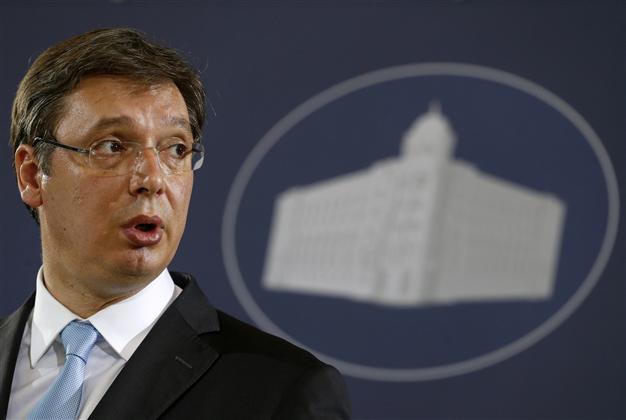Serbian prime minister hints at early election
BELGRADE – Reuters

Serbia?s Prime Minister Aleksandar Vucic speaks during a press conference after talks with Bosnia's three-member presidency, in Belgrade, Serbia, Wednesday, July 22, 2015. AP Photo
Serbia’s prime minister hinted Aug. 19 at a possible snap election, confident of winning a new four-year mandate with his opponents close to disarray, the state news agency reported.
Aleksandar Vucic took office in April 2014 after a resounding election win by his conservative Serbian Progressive Party.
Visiting a Belgrade park packed with migrants and refugees en route through Serbia to Hungary and the European Union, Vucic was reported by the state news agency Tanjug as saying he was considering early elections but that no decision had been taken.
The report cited Vucic as saying his opponents constantly called for elections. “Perhaps their wish will come true,” he said.
“You can see these people want that [elections], and I respect our political opponents,” he said.
His government is promising to raise public sector wages and pensions by the end of the year, having trimmed them in late 2014 in order to clinch a standby loan deal with the International Monetary Fund. The country looks on course to achieve slight economic growth this year.
Vucic remains popular in polls, though some Serbians and Western diplomats are concerned about shrinking media freedoms.
Vucic’s opponents accuse him of authoritarianism, having won a mandate unseen since the days of late Serbian strongman Slobodan Milosevic in the 1990s, a charge the government rejects. The main opposition Democratic Party was routed in the last election and has struggled to regain its footing.
An ultra-nationalist during the wars of Yugoslavia’s collapse, Vucic performed a political U-turn in 2008 and embraced Serbia’s drive to join the European Union.
He has rebranded himself as a conservative reformer committed to cutting the budget deficit and debt and to shrinking the public sector.
“This year we’ll have growth, perhaps even as much as 1 percent, which is unheard of in times of fiscal consolidation; pay and pensions will rise, because we have the fiscal room ... And to all of that you hear ‘nothing’s any good’,” he said.
